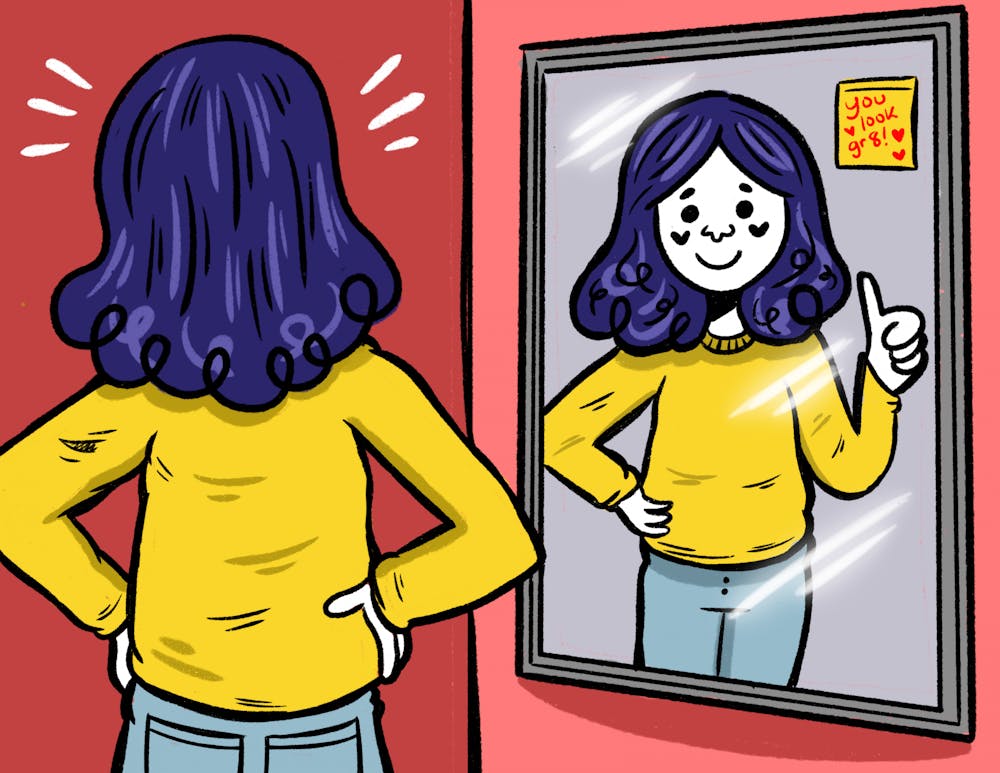Body image can have a profound impact on an individual's self-perception. For many students, high school is a time filled with insecurity and doubt, fueled by the need for peer acceptance. Students often feel the need to conform to attain unrealistic societal standards of beauty. However, once students transition to college, there is a shift in their perception of body image.
According to Everyday Health, two-thirds of parents said their children between ages 8 and 18 expressed worry or anxiety about their body image. However, in a National Library of Medicine study, only about 13% of college students were dissatisfied with their body image. The facts clearly show a positive shift in perspective from a younger age at home to an older age on their own.
Juliana Pepple, a fifth-year studying psychology, vividly recalls her inaugural college experience in 2018. In the past, she grappled with self-doubt as she did not conform to the "standard image of beauty," like her female peers in high school. However, college has introduced her to a transformative perspective on self-image.
"When I started college, I noticed such a drastic change," Pepple said. "Everyone that was here was just minding their own business and doing their own thing … So once that happened, I kind of just stopped caring."
During these insightful moments, college has offered Pepple a liberating atmosphere in which concerns about appearances became less significant. People discovered a profound sense of self-acceptance, recognizing that everyone around her had their priorities and pursuits to focus on. Unlike high school, college allows the personal freedom to explore and focus on one's abilities rather than appearance.
"I've just started to feel more confident and more comfortable in my own skin," Pepple said.
In relation to Pepple, Eileen Marsal Koch, a licensed clinical counselor and eating disorder support coordinator, emphasizes the internalization of body image through interactions with students.
"Every student that sits with me almost without exception will say, 'I'm really worried that other people are judging me,'" said Koch. "And what I say is, 'They don't have time, they're too busy worrying about you, judging them.'"
With jam-packed schedules, lectures, countless assignments and trying to balance a social life, college students do not have the luxury of time, especially not to scrutinize the appearance of others.
The truth of the matter is that while a person may feel as though they are being judged, people are too caught up in their own lives to even pay notice.
With shifts in a student's environment, peers and daily schedules, a notable shift in behavior also occurs in college.
Luke Zigarovich, a senior studying sports management, suggests that in high school, a greater emphasis was placed on conforming to beauty standards due to maturity levels and bias judgments prevalent at that stage.
"I think people were more judgmental and hard on others in high school compared to now," said Zigarovich. "College is a big town with people from all over the place who adapt to help make everyone fit in."
Playing the "game" of high school is about "who's who," defining a person's social status, popularity and cliques. With the growth in maturity and acceptance of others, this childish game is no longer played.
For many, college is a time to experiment and find one's true, authentic self. With over 28,000 students roaming the red bricks, Ohio University is painted with diversity and people from many different walks of life. This atmosphere leads to an inclusive environment for every Bobcat to express themselves unapologetically.
"The good news is there is hope," said Koch. "So when people are struggling with (body image) they can come in for counseling to work on it."






